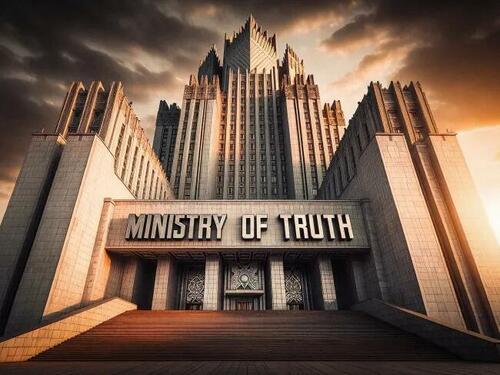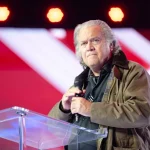
Authored by Wanjiru Njoya via The Mises Institute,
Ludwig von Mises depicts the aim of revolutionary socialism as: “to clear the ground for building up a new civilization by liquidating the old one.” One of the main strategies in liquidating a civilization involves dismantling its legal and philosophical foundations. This role is fulfilled by activists who embark upon “sabotage and revolution” by subverting the meaning of words: “The socialists have engineered a semantic revolution in converting the meaning of terms into their opposite.”
George Orwell famously called this subversive language “Newspeak.” Peter Foster describes Newspeak as “a sort of totalitarian Esperanto that sought gradually to diminish the range of what was thinkable by eliminating, contracting, and manufacturing words.”
Mises explains that dictators express their ideas in Newspeak precisely because, if they did not, nobody would support their schemes:
This reversal of the traditional connotation of all words of the political terminology is not merely a peculiarity of the language of the Russian Communists and their Fascist and Nazi disciples. The social order that in abolishing private property deprives the consumers of their autonomy and independence, and thereby subjects every man to the arbitrary discretion of the central planning board, could not win the support of the masses if they were not to camouflage its main character. The socialists would have never duped the voters if they had openly told them that their ultimate end is to cast them into bondage. (emphasis added)
In the proliferation of Newspeak, the reinterpretation of “human rights” has proved to be one of the most powerful weapons of sabotage and revolution. Activists have seized control of a vast empire of international law, NGOs, and human rights charities with a global network of staff who monitor respect for “human rights.” They wield their significant influence in the human rights industry to undermine human liberty by redefining the meaning of “human rights” to denote the antidiscrimination principle. Under the banner of equality and nondiscrimination, they restrict free speech and other human liberties. In other words, the doctrine of “human rights” now denotes the precise opposite: the destruction of human liberty.
The “human right” to non-discrimination
Human rights no longer mean what many might suppose: the right to life, liberty, and property. The vast corpus of human rights in international law has been categorized by Karel Vašák into three: civil-political, socio-economic, and collective-developmental. These categories are said to encompass negative rights (things the state must not do, such interfering with life, liberty, or property), positive rights (things the state must do, for example, provide citizens with food, shelter, education, healthcare, etc.), and rights of solidarity between citizens such as wealth redistribution through social welfare schemes and equal participation in economic progress through measures such as the minimum wage or equal pay.
Human rights organizations monitor progress against these categories and ensure that the legal system works in favor of socialist goals and against liberty. For example, the United Nations human rights program educates the public on the need to eradicate “hate speech” and interprets “equal protection” of the law, as a fundamental human right, to mean protection from hate speech. The UN says:
Addressing hate speech does not mean limiting or prohibiting freedom of speech. It means keeping hate speech from escalating into more something more dangerous, particularly incitement to discrimination, hostility and violence, which is prohibited under international law.
From that description, it can be seen that the UN takes a concept which is well-established in the criminal law, namely, prohibiting incitement to violence, and links it to notions of incitement to discrimination and incitement to hostility, which have never before been recognized as crimes. They annex discrimination and hostility to the charge of inciting violence because, if they did not, it would be immediately clear to everyone that criminalizing “discrimination” or “hostility” amounts to nothing less than Newspeakian crimethink.
The meaning of human rights
In his article, “There’s no such thing as Human Rights,” the British journalist Peter Hitchens argues that,
Human rights do not exist. They are an invention, made out of pure wind. If you are seriously interested in staying free, you should not rely on these flatulent, vague phrases to help you.
They are in fact a weapon in the hands of those who wish to remove your liberty and transform society, though this is probably an accident. It is only in the past 50 years or so that radical judges have realised these baseless declarations can be used (for example) to abolish national frontiers or give criminals the right to vote.
In that context, Hitchens is referring not to the ancient liberties protected by Magna Carta, but to the Newspeakian rights now enshrined in human rights instruments, such as the UN Declaration of Human Rights and the European Convention on Human Rights. Human rights have been transformed into wooly concepts which merely reflect political and partisan demands.
Murray Rothbard avoids the ambiguity surrounding the meaning of human rights by defining them as property rights. In the Ethics of Liberty, he explains:
...the concept of “rights” only makes sense as property rights. For not only are there no human rights which are not also property rights, but the former rights lose their absoluteness and clarity and become fuzzy and vulnerable when property rights are not used as the standard.
In the first place, there are two senses in which property rights are identical with human rights: one, that property can only accrue to humans, so that their rights to property are rights that belong to human beings; and two, that the person’s right to his own body, his personal liberty, is a property right in his own person as well as a “human right.” But more importantly for our discussion, human rights, when not put in terms of property rights, turn out to be vague and contradictory, causing liberals to weaken those rights on behalf of “public policy” or the “public good.”
Thus, the Rothbardian interpretation of human rights denotes the universal right to self-ownership and private property that vests in all human beings.
Bureaucratic reinterpretation
In practice, the meaning of human rights is subject to interpretation by courts or other law enforcement officials. Therefore, human rights ultimately mean only what they are interpreted to mean by law enforcement, not what they may theoretically, politically, or philosophically. Lowell B. Mason, an attorney and former chair of the Federal Trade Commission explains the significance of bureaucratic interpretation by observing wryly that:
When in private practice I never told clients what the law was; I always told them what the bureaucrats thought the law was… The legality or illegality of what you do often depends not on the words of a statute enacted by your elected representatives, but on the state of the collective liver of a dozen anonymous bureaucrats.
Being well aware of this, the goal of activists is to ensure that “human rights” are interpreted so as to advance their goals. This explains the concerted efforts to depict “hate speech” as a human rights violation. In this way the commitment of states to protecting “human rights” is transformed, through the prism of the antidiscrimination principle, into an edict to prohibit hate speech. The word “hate” is interpreted to mean having the temerity to disagree with socialists, and similarly, the word “equality” is interpreted to mean wealth redistribution to achieve equality of material conditions.
Mason explains how it is possible for bureaucrats, charged with law enforcement, to reinterpret the Constitution to suit whatever they think the law ought to achieve. No matter how carefully a law is drafted, it will always require interpretation, and this is where the bureaucrats strike as they purport to be applying the “evolving” meaning of the Constitution. Mason explains:
“Of course,” he will reassure you, “the Constitution still stands as a bulwark to liberty but it is a growing instrument that adapts itself to the times, and while it has not been repealed or amended, it has necessarily been reinterpreted so that due process (as it was known in the past) no longer unduly encumbers the administration of the law.”
Through Newspeak, the Constitution itself has been reinterpreted, enabling socialists to claim that they support free speech and also support the prohibition of “hate speech.” Mises explains that this subverts the concept of freedom into its very opposite: “Freedom implies the right to choose between assent and dissent. But in Newspeak it means the duty to assent unconditionally and strict interdiction of dissent.” In that sense, the concept of “hate speech” is not compatible with free speech. In denoting any dissent as “hate,” it is the very negation of free speech and freedom of thought. Through Orwellian Newspeak, ordinary words like “liberty,” “justice,” and “equality”—values that most people would support—have been subverted and harnessed to promote socialism.
Authored by Wanjiru Njoya via The Mises Institute,
Ludwig von Mises depicts the aim of revolutionary socialism as: “to clear the ground for building up a new civilization by liquidating the old one.” One of the main strategies in liquidating a civilization involves dismantling its legal and philosophical foundations. This role is fulfilled by activists who embark upon “sabotage and revolution” by subverting the meaning of words: “The socialists have engineered a semantic revolution in converting the meaning of terms into their opposite.”
George Orwell famously called this subversive language “Newspeak.” Peter Foster describes Newspeak as “a sort of totalitarian Esperanto that sought gradually to diminish the range of what was thinkable by eliminating, contracting, and manufacturing words.”
Mises explains that dictators express their ideas in Newspeak precisely because, if they did not, nobody would support their schemes:
This reversal of the traditional connotation of all words of the political terminology is not merely a peculiarity of the language of the Russian Communists and their Fascist and Nazi disciples. The social order that in abolishing private property deprives the consumers of their autonomy and independence, and thereby subjects every man to the arbitrary discretion of the central planning board, could not win the support of the masses if they were not to camouflage its main character. The socialists would have never duped the voters if they had openly told them that their ultimate end is to cast them into bondage. (emphasis added)
In the proliferation of Newspeak, the reinterpretation of “human rights” has proved to be one of the most powerful weapons of sabotage and revolution. Activists have seized control of a vast empire of international law, NGOs, and human rights charities with a global network of staff who monitor respect for “human rights.” They wield their significant influence in the human rights industry to undermine human liberty by redefining the meaning of “human rights” to denote the antidiscrimination principle. Under the banner of equality and nondiscrimination, they restrict free speech and other human liberties. In other words, the doctrine of “human rights” now denotes the precise opposite: the destruction of human liberty.
The “human right” to non-discrimination
Human rights no longer mean what many might suppose: the right to life, liberty, and property. The vast corpus of human rights in international law has been categorized by Karel Vašák into three: civil-political, socio-economic, and collective-developmental. These categories are said to encompass negative rights (things the state must not do, such interfering with life, liberty, or property), positive rights (things the state must do, for example, provide citizens with food, shelter, education, healthcare, etc.), and rights of solidarity between citizens such as wealth redistribution through social welfare schemes and equal participation in economic progress through measures such as the minimum wage or equal pay.
Human rights organizations monitor progress against these categories and ensure that the legal system works in favor of socialist goals and against liberty. For example, the United Nations human rights program educates the public on the need to eradicate “hate speech” and interprets “equal protection” of the law, as a fundamental human right, to mean protection from hate speech. The UN says:
Addressing hate speech does not mean limiting or prohibiting freedom of speech. It means keeping hate speech from escalating into more something more dangerous, particularly incitement to discrimination, hostility and violence, which is prohibited under international law.
From that description, it can be seen that the UN takes a concept which is well-established in the criminal law, namely, prohibiting incitement to violence, and links it to notions of incitement to discrimination and incitement to hostility, which have never before been recognized as crimes. They annex discrimination and hostility to the charge of inciting violence because, if they did not, it would be immediately clear to everyone that criminalizing “discrimination” or “hostility” amounts to nothing less than Newspeakian crimethink.
The meaning of human rights
In his article, “There’s no such thing as Human Rights,” the British journalist Peter Hitchens argues that,
Human rights do not exist. They are an invention, made out of pure wind. If you are seriously interested in staying free, you should not rely on these flatulent, vague phrases to help you.
They are in fact a weapon in the hands of those who wish to remove your liberty and transform society, though this is probably an accident. It is only in the past 50 years or so that radical judges have realised these baseless declarations can be used (for example) to abolish national frontiers or give criminals the right to vote.
In that context, Hitchens is referring not to the ancient liberties protected by Magna Carta, but to the Newspeakian rights now enshrined in human rights instruments, such as the UN Declaration of Human Rights and the European Convention on Human Rights. Human rights have been transformed into wooly concepts which merely reflect political and partisan demands.
Murray Rothbard avoids the ambiguity surrounding the meaning of human rights by defining them as property rights. In the Ethics of Liberty, he explains:
…the concept of “rights” only makes sense as property rights. For not only are there no human rights which are not also property rights, but the former rights lose their absoluteness and clarity and become fuzzy and vulnerable when property rights are not used as the standard.
In the first place, there are two senses in which property rights are identical with human rights: one, that property can only accrue to humans, so that their rights to property are rights that belong to human beings; and two, that the person’s right to his own body, his personal liberty, is a property right in his own person as well as a “human right.” But more importantly for our discussion, human rights, when not put in terms of property rights, turn out to be vague and contradictory, causing liberals to weaken those rights on behalf of “public policy” or the “public good.”
Thus, the Rothbardian interpretation of human rights denotes the universal right to self-ownership and private property that vests in all human beings.
Bureaucratic reinterpretation
In practice, the meaning of human rights is subject to interpretation by courts or other law enforcement officials. Therefore, human rights ultimately mean only what they are interpreted to mean by law enforcement, not what they may theoretically, politically, or philosophically. Lowell B. Mason, an attorney and former chair of the Federal Trade Commission explains the significance of bureaucratic interpretation by observing wryly that:
When in private practice I never told clients what the law was; I always told them what the bureaucrats thought the law was… The legality or illegality of what you do often depends not on the words of a statute enacted by your elected representatives, but on the state of the collective liver of a dozen anonymous bureaucrats.
Being well aware of this, the goal of activists is to ensure that “human rights” are interpreted so as to advance their goals. This explains the concerted efforts to depict “hate speech” as a human rights violation. In this way the commitment of states to protecting “human rights” is transformed, through the prism of the antidiscrimination principle, into an edict to prohibit hate speech. The word “hate” is interpreted to mean having the temerity to disagree with socialists, and similarly, the word “equality” is interpreted to mean wealth redistribution to achieve equality of material conditions.
Mason explains how it is possible for bureaucrats, charged with law enforcement, to reinterpret the Constitution to suit whatever they think the law ought to achieve. No matter how carefully a law is drafted, it will always require interpretation, and this is where the bureaucrats strike as they purport to be applying the “evolving” meaning of the Constitution. Mason explains:
“Of course,” he will reassure you, “the Constitution still stands as a bulwark to liberty but it is a growing instrument that adapts itself to the times, and while it has not been repealed or amended, it has necessarily been reinterpreted so that due process (as it was known in the past) no longer unduly encumbers the administration of the law.”
Through Newspeak, the Constitution itself has been reinterpreted, enabling socialists to claim that they support free speech and also support the prohibition of “hate speech.” Mises explains that this subverts the concept of freedom into its very opposite: “Freedom implies the right to choose between assent and dissent. But in Newspeak it means the duty to assent unconditionally and strict interdiction of dissent.” In that sense, the concept of “hate speech” is not compatible with free speech. In denoting any dissent as “hate,” it is the very negation of free speech and freedom of thought. Through Orwellian Newspeak, ordinary words like “liberty,” “justice,” and “equality”—values that most people would support—have been subverted and harnessed to promote socialism.
Loading…





